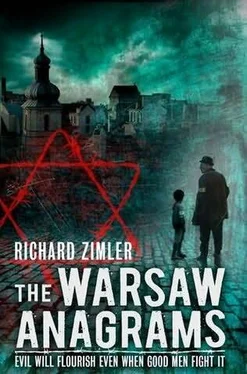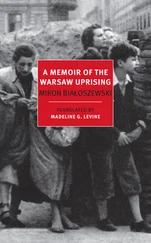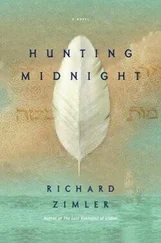I thought I might have a chance against such an oddball, but within twenty minutes he had taken my queen, both bishops and a rook. Worse, the upstart had chosen his moves with lightning speed, making it nearly always my turn. A few minutes later, he had my king cornered.
When Adam asked how he could play so quickly, Ziv replied, ‘I’ve always been able to think many moves ahead – up to ten or twelve, of late.’
After that, my nephew began to look at the older boy with eager curiosity, and late that night, he trudged over to me from out of his sleep, while I was lighting my pipe at our window, and asked if I thought that Ziv was smarter than other people.
‘Maybe, though there are different ways of being smart,’ I told him.
‘Is that why he’s always quiet, and so… so strange?’
Sighing, I took his shoulder. ‘Wait till you’re seventeen, young man, and you’ll see it isn’t an easy age.’
While he was humiliating me at chess, Ziv had mentioned that Ewa’s paediatrician father had started giving medical check-ups to children in an inter-school chorus. An opportunity for Adam? The boy enjoyed singing as long as no spotlight was on him, and when I asked him the next morning if he’d permit me to talk to the music director, he eagerly agreed.
That afternoon, I found out his name – Rowan Klaus – and paid a call on him at his small office in Adam’s school. An earnest young man in his early twenties, he had olive skin and intelligent black eyes – handsome in a mysterious, Sephardic way.
Rowy – as he preferred to be called – told me he’d studied violin at the Vienna Conservatory until the Nazis added Austria to their bag of goodies. He wore a homemade splint on his right index finger, and when I asked him about it, he replied that he’d just returned from a labour camp where the Germans had forced him and twenty other Jewish men to dig ditches along the Vistula. ‘The goons knew I was a violinist, so when they decided I wasn’t digging fast enough, they held me down and broke it with a hammer.’
Now, he was terrified he’d fall victim to another labour round-up. ‘I pay regular bribes, but they don’t give out guarantees,’ he told me morosely.
Over the next half-hour, Rowy spoke of music as a noble pursuit, emphasizing his opinions with German slang and exuberant hand gestures. Adam would be charmed by him, so I signed the boy up for an immediate tryout, and later that afternoon he successfully warbled his way up and down his solfeggio exam.
He would still have to pass the medical check-up, however.
Dr Mikael Tengmann, Ewa’s father, was a cheerful, duck-footed Charlie Chaplin look-alike. In his fifties, the lucky physician still had a crest of wild black hair and a youthful glimmer in his deep brown eyes. He and Ewa lived above a broom-maker’s workshop on Wałowa Street, and they’d converted one of the bedrooms into his medical office and the dining area into a waiting room.
The next morning, he weighed Adam and jotted down his height, poked and prodded him in various sensitive places, and listened to his chest with a stethoscope. While he noted down Adam’s measurements, I studied the pictures of the Alps on his walls; the deep shadows and surges of sunlit stone made the mountains look like entwined torsos. All but one bore the physician’s signature; a small photograph of a white-glowing Matterhorn had been signed, ‘To Mikael from Rolf.’
When I asked about it, the doctor replied that he and a university friend had shared what he called ‘an interest in how and why we seek out the human form in nature’.
An answer that pleased me. And to my relief, Mikael soon concluded that Adam was healthy – though too skinny – with no sign of scabies, tuberculosis or any other disease he might spread to the other miniature Carusos. Before we left, he went to his kitchen and offered Adam a big jar of horseradish as a present, since the little traitor had told him that he’d eaten the last of our supply weeks earlier and that it was the bland food we forced on him that had sent his appetite packing. Electric with excitement, the boy grabbed the jar and hopped around the room like a kangaroo.
I decided it was time for my nephew to learn English as well, especially since Polish and German no longer seemed to have a future tense for Jews. We started with the lyrics of Cole Porter’s ‘Don’t Fence Me In’ and it became the anthem he and I would sing every Sabbath. But they did fence us in, of course, and on Saturday, 16 November, we were sealed inside our Jewish prison. Our universe was reduced to little more than one square mile.
Right away, residents began hoarding flour, butter, rice and other essentials. I bought half a dozen black ribbons for my Mała typewriter just in case I got the urge to put some thoughts down on paper. Prices rose so high that Stefa would sneer at the absurdity of buying potatoes at 95 złoty a kilo or asparagus one stalk at a time for 1 złoty each. And the queues – wrapping around entire city blocks – were worthy of a biblical census day. To buy new shoes for Adam, I waited two and a half hours in one of those dismal Warsaw drizzles that always made my father promise to move us to the desert.
Over that first week, we all came out into the street as though shipwrecked, gazing at the perimeter of brick and barbed wire shutting us in as if someone had written us into a Kafka short story. We had become four hundred thousand outcasts corralled in our own city.
How is it possible? A question that makes no sense now that we know what we know, but at the time astonishment – and unspoken dread – widened nearly everyone’s eyes, even the old Hasidic rabbis, who were used to seeing strange and impossible visions descending upon them from out of the firmament of their prayers.
Thankfully, Christians could still come inside with authorization, and Jaśmin Makinska, a former patient of mine, brought us fresh fruit and vegetables – as well as delicacies like coffee and jam – a couple of times a week. She was in her early sixties and worked nearby, at an art gallery just off Market Square. She brushed her hair into an aristocratic crest of white and wore exuberantly feathered hats, which both awed and amused Adam.
Jaśmin visited us for the last time at the end of November. When I opened the door to her, she fell into my arms. Her cheeks and hair were streaked with mud, and her tweed coat was ripped at the collar. Her ostrich-feather hat was in her hand – and ruined.
‘My God, what’s happened?’ I asked, steering her to the sofa.
Jaśmin told us that German guards had discovered half a dozen bars of Stefa’s favourite lavender soap in her handbag and had confiscated them. When she’d protested, one of the Nazis grabbed her, threw her down and dragged her into the guardhouse. Adam wasn’t in the room, but the terror-stricken woman wouldn’t tell us exactly what had happened next.
I went to the kitchen for vodka and came back to find Stefa whispering to Jaśmin while cleaning her cheeks with a towel. When my niece looked up, her eyes were darkly hooded, and I realized then what should have been obvious: the German guard had raped her.
Without Jaśmin’s supplies, we would need a good deal of cash to bolster our rations of coarse black bread and potatoes, and I decided to look into the possibility of selling off some of the jewellery and silverware I’d brought with me into the ghetto. Through Jewish smugglers who ventured regularly into what we had begun to call Sitra Ahra – the Other Side – I was able to make enquiries at the antique shops and galleries along Nowy Świat in early December. Unfortunately, the owners – friends, I’d once believed – offered only a small fraction of what my treasures were worth. So I held on tight for the time being.
Читать дальше












